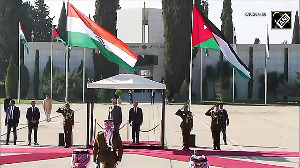The 'national' press conference addressed by Prime Minister Manmohan Singh on May 24 wanted to focus on the performance of his government during the first year of his second term in office, but as expected, it covered all national and international issues.
The questions asked by the media were directed to elicit answers on India-Pakistan relations, Naxalism and the economic situation, particularly the price rise in the country.
This was the third general press conference of Dr Singh; the first one was held soon after he finished 100 days in office and the second one was held about the India-United States nuclear agreement.
During his last press conference, Dr Singh had indicated that he would like to meet the media at regular intervals, but that has never happened.
The only prime minister to regularly hold press conferences was Jawaharlal Nehru. As a young officer in the Press Information Bureau, I used to be on 'duty' at the meets.
Since then, I have had the advantage of being on duty at various prime ministers' press conferences in different capacities, including conducting them.
One learnt a great deal listening to Nehru at the press conference. He used to take great pains to explain the national and international policies of the government of India. He would speak at length on the policy of non-alignment, planned development, the Kashmir issue, and international events like the Suez Crisis and the Soviet invasion of Hungary.
Nehru would conduct the press conference himself and would allow supplementaries from journalists. Occasionally, he would get provoked and burst out with remarks like 'fantastic nonsense'. Pressmen would wait for such moments.
During those days, there were no television cameras. The Bell and Howell cameras of the Films Division and international news agencies like Visnews and the Associated Press made a lot of sound. There were hardly a dozen or so still photographers.
Many years later, I had the opportunity of meeting N K Sheshan, one of the two personal assistants of Jawaharlal Nehru. He told me that there was hardly any 'preparation' for the press conference in the Prime Minister's Office.
His successor, Lal Bahadur Shastri, did not hold a press conference.
Indira Gandhi revived the practice. She, I was told by her information advisor H Y Sharada Prasad, prepared herself meticulously before meeting the press. Detailed notes were prepared on likely questions that might come up. She would also read prepared statements at the press conference before questions were put to her.
Morarji Desai, her successor, met the press soon after assuming office. My recollection is that the occasion turned out to be a debating session with the press, with the first few questions focused on urine therapy.
Prime Minister Charan Singh never faced a formal press conference.
During her second term as prime minister, Indira Gandhi continued to address press conferences. Many of those focused on events like the Non-Aligned Summit and the Commonwealth heads of government meet.
The press conferences of Rajiv Gandhi used to be lively and informative. They were structured: domestic issues, party matters and foreign affairs. He would keep some quotations ready for the occasion. His associate Sharada Prasad used to allow one supplementary to each question.
But what stands out in my memory was the press conference in which Rajiv Gandhi's answer to a question resulted in the resignation of India's then foreign secretary A P Venkateshwaran.
Asked about the dates of his visit to Pakistan to attend the SAARC summit by a correspondent from Pakistan's Jung group, Rajiv Gandhi responded that he had not decided about the visit. When the Pakistani correspondent pointed out that the Indian foreign secretary had indicated that such a visit was about to take place. Rajiv Gandhi replied, "You can ask the question to the new foreign secretary.''
The press conference ended abruptly, and a little later A P Venkateshwaran told me that he had submitted his resignation.
When Vishwanath Pratap Singh became the prime minister, the Vigyan Bhavan was under repair, and he met the press at the Siri Fort. I recall that he used to be briefed by senior officers in the PMO about information on likely questions.
The second press conference of V P Singh was a controversial one, as the National Front government was on the brink, following the exit of Devi Lal and the government's acceptance of the Mandal Commission's recommendations.
Only the cabinet secretary, the foreign secretary and the home secretary attended the prime minister's press conferences those days.
I recall there was a great deal of discussion when then Information Minister P Upendra wanted to be seated on the dais.
The media too has changed. Today, the audio-visual media is dominating the scene. The media advisor has to ensure that as many correspondents are able to ask questions, including news agencies, national and regional newspapers, besides foreign newspapers and the audio-visual media. A complex task indeed.
I had superannuated before P V Narasimha Rao agreed to address a press conference. Deve Gowda and Inder Gujral were in office for too short a period to address press meets.
As far as Atal Bihari Vajpayee was concerned, his interactions with the media were always lively, but his failing health prevented him from addressing press conferences. What one remembers are his long pauses before he answered a question, and many of the answers were interpreted differently.
Dr Singh gives the impression that he is willing to share information with the media. One hopes that PM's press conferences are held more often and are not restricted to being annual events.
I Ramamohan Rao is a former Principal Information Officer, Government of India





